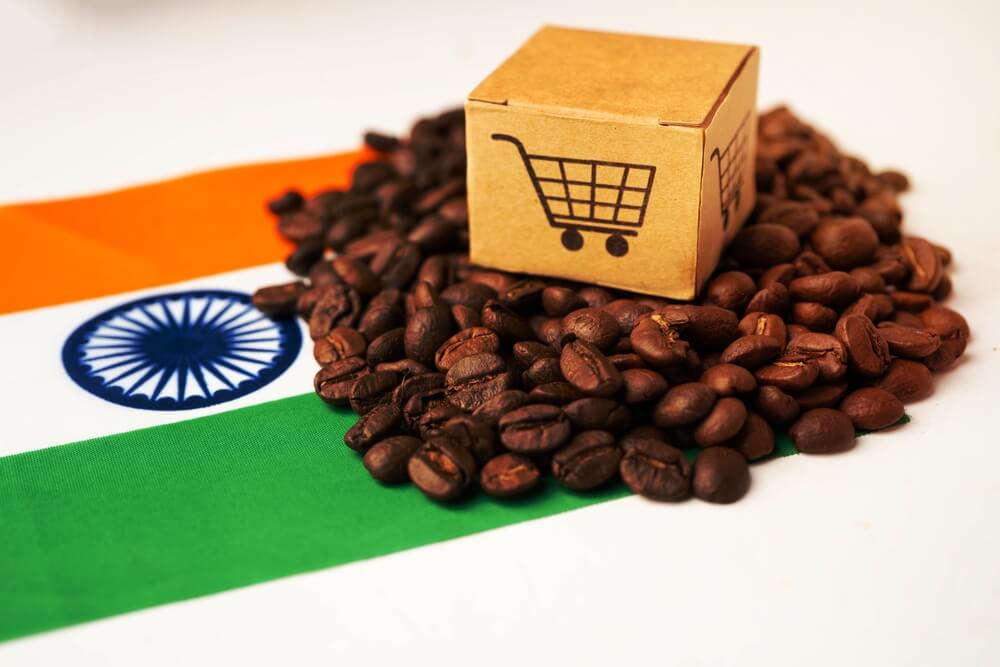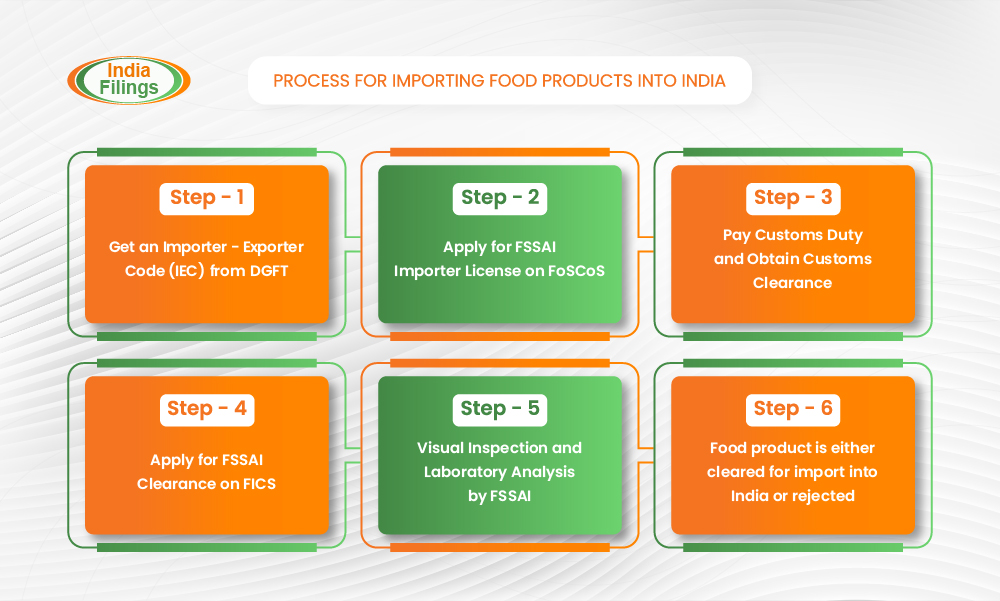How to Import Food Products into India

How to Import Food Products into India
The Food Safety and Standards Authority of India (FSSAI) controls the import of food products into India. The FSSAI has published regulations and notifications that must be followed while importing food products. If the food products are not as per FSSAI regulations, the consignment will be rejected and not allowed into India. Therefore, Entrepreneurs and Businesses that import food products into India must be aware of the FSSAI procedures and regulations relating to food product import. In this article, we look at the FSSAI regulations that concern food imports into India.
Licenses and Registrations
The following licenses and registration would be required for importing food products into India. It is essential to obtain these licenses or registrations before sending any food consignment to India.
- Private Limited Company or LLP – Click here to learn more. (This is optional. However, recommended as it improves the transferability of the business and limits personal liability).
- GST Registration (Required for selling goods or products in India).
- Importer Exporter Code from DGFT (Required for importing or exporting goods)
- Product Approval from FSSAI (if the product proposed to be imported nonstandardized, i.e., it does not conform to the food standards prescribed under the FSS Act and regulations thereunder).
To register a company or obtain business registrations, visit IndiaFilings.com.
Step #1: Importer-Exporter Code
It is essential to obtain IEC, and is a must while importing or exporting any goods to or from India. In this case, you need an IEC to import food items to India, and you need to apply for one well in advance as you will need it while obtaining the license for importing and the NOC.
You can apply for an Import Export code through IndiaFilings and obtain it within 6 to 7 days.
Step #2: FSSAI Importer License
One of the significant requirements for importing food products or ingredients into India is the FSSAI Importer License. The FSSAI Importer license is required for traceability. Obtaining the Importer exporter code is mandatory to apply for the FSSAI License for Importers.
To get the FSSAI license, Access the official website of FoSCoS. From the home page, click the License/Registration option and select Apply for License/Registration.
Select the State and Read the Note before proceeding. Read the Group Heads of Kind of Business and select Importer under trade/retail.
Under Importers KOB, read the definition, click on the radio button to apply for the central license, and click on Proceed.
Fill in all the mandatory fields as shown in Form B. Please fill the communication details with caution as all the communication made by the authority will be done to the mentioned contact details viz Mobile Number or Email Id etc. Fill GST/PAN/CIN in the relevant fields as applicable to the firm/company.
On the Product Selection page, fill in the details for DGFT Authentication and click “Proceed with DGFT Authentication” to authenticate the details. Finally, click on “Save” to save reliable information.
After successfully proceeding with DGFT validation, click on Save & Next. Pay the fee with available modes and apply. Upload all the documents as mentioned below:
- List of Directors/Partners/Proprietor/Executive Members of Society/Trust with full address and contact details.
- Photo ID and address proof issued by the governing authority of the Proprietor/Partner/Directors/Authorized Signatory
- Partnership Deed/Self Declaration for proprietorship /Memorandum of Articles of Association towards the firm’s constitution.
- Form IX: Nomination of persons by a company along with the Board Resolution (Not required) in case of Proprietorship Firm)
- IE Code document issued by the DGFT
After completing the payment, a receipt will be generated with a 17-digit reference number which can be used for future reference.
The applicant can track the status of the application through the FoSCoS Homepage.
Step #3: Customs Clearance
Before the food consignment arrives by air or seaport in India, the importing food business operator must prepare an Authority Letter in favor of a Customs Handling Agent (CHA) addressed to the FSSAI/ Authorised officer.
On arrival of the consignment, the Customs Handling Agent, based on the authorization letter, would apply for clearance of consignment with the Department of Customs based on the Bill of Entry. A Government Customs Agent would verify the consignment and clear the same after clearance of customs formalities and payment of customs duty.
Step #4: Applying for FSSAI Clearance
On obtaining Customs Department clearance, the Customs Handling Agent must apply the Food Import Clearance System (FICS) of FSSAI to get the ‘No Objection Certificate.
The documents required to be uploaded in the FSSAI platform for FSSAI clearance are:
- Importer Exporter Code issued by the DGFT;
- FSSAI Food Business License;
- Bill of Entry;
- Examination Order generated by the EDI system of Customs, therein requiring NOC from the FSSAI.
In addition to the above documents, the additional documents may also be required on a case-to-case basis:
- Import Permit issued by the Ministry of Agriculture, Government of India, in case of primary agriculture produce/ horticultural produce;
- Sanitary Import Permit issued by Department of Animal Husbandry, Government of India, in case of livestock products;
- Registration of import contracts for poppy seeds with Central Bureau of Narcotics, Gwalior;
- Certificate of Origin issued by Authorised Person/ Agency at the place of manufacturing/ processing etc., of the food consignment. Certificate of Origin shall contain information on Country of Origin etc., if the consignor is from a different country;
- Phyto-Sanitary Certificate issued by the Plant Quarantine Department of Exporting Country in case of primary agriculture/ horticulture produce with fumigation endorsement;
- Certificate of Analysis with the composition (Ingredients). In the case of the Wine & Whiskey – Test Certificate;
- End-use declaration – The Food Importer has to declare the end use of the imported food product;
- Pumping Guarantee Certificate in case of edible oil imported in bulk;
- List of a transit country if the food consignment is trans-shipped through more than one country;
- Temperature Chart / Report / Graph, if the food consignment trans-shipped under the Cold Chain Technologies (CCT) from the port of origin to the point of import;
- Stuffing list, Packing List;
- Commercial invoice as mentioned in the Bill of Entry (BoE);
- Bill of Lading as mentioned in the Bill of Entry (BoE) for sea consignment;
- Air Way Bill as mentioned in the Bill of Entry (BoE) for air consignment;
- In the case of the aseptic package, a declaration by an undertaking from the manufacturer that the representative sealed sample is from the same batch of the consignment;
- In the absence of a representative sample for the aseptic package, the Importer should furnish an Undertaking to the effect that they do not have any objection to breaking open the sealed aseptic container from the consignment and collect the sample for laboratory analysis and the Food Authority is not responsible for any damage to the shipment due to such drawl of the model as it is necessary for the clearance of the cargo. Similarly, if the sample quantity is insufficient to draw the duplicate sample, the Importer shall submit a declaration that ―no claim shall be made for re-testing if the primary test fails;
- In case of reimport, in addition to the documents listed above, submit the documents filed in the customs at the time of export as well as a copy of the rejection certificate with reasons for such rejection(s) issued by the Officials of importing country before its re-export thereby leading to reimport into India;
- High Sea Sale Agreement;
- Radio Activity Certificate, if irradiation is used;
- Any other report(s) / document(s) / undertaking (s)/ Affidavit(s) as directed and as specified by the Authorised Officer or by the Food Authority from time to time
Step #5: Inspection and Sampling of the Consignment
Once an application is made in the Food Import Clearance System with the above documents, an FSSAI Officer will verify the documents and request more information (if required only). If the application is accepted, the Imported will be asked to deposit fees for FSSAI clearance based on the number of samples.
Also, the FSSAI Officer will fix a date and time for a visual inspection of the consignment. During the visual inspection of the shipment, the following parameters will be verified:
- The physical condition of the shipment for visible insects and fungal infestation;
- The valid remaining shelf life of the product is more than 60% of its original shelf life at the time of import clearance;
- Compliance with the FSS (Packaging & Labelling) Regulations, 2011, and the product-specific labeling requirements;
- Rectification of labeling deficiencies, namely:
- Name and address of the Importer
- FSSAI logo and license number
- Veg / Non-Veg Symbol
After the visual examination, the FSSAI Officer would draw two samples from the consignment for testing. One of the sealed and labeled Food samples will be sent to a randomly selected laboratory by the Food Import Clearance System. The second food sample will be stored in appropriate conditions for re-testing if the need arises.
The laboratory would analyze the samples of imported Food sent by the Authorised Officer per the parameters defined in the Food Safety and Standards Act and the Regulations. The lab must send its report within five days to the Authorised Officer with a conclusive opinion about the product tested as conforming or non-conforming.
Step #6 Approval of Food Product into India
Suppose the authorized lab issues an opinion report confirming that the food consignment conforms with the FSSAI regulations. In that case, the FSSAI Officer will issue a No Objection Certificate (NOC)/Non-Conformance Certificate (NCC). The food product would then be cleared for import into India and released from the customs warehouse.
Labeling Requirements on Food Import of Food Products in India
While importing any food items to India, the labels of the items should be specific and have certain details for them to be acceptable and sold in the market. They are as follows:
- The Labelling Language used must be as per FSSAI Packaging & Labelling Regulations, 2011, and the product-specific labeling requirements. Also, the Food Safety & Standards (Import) Regulations, 2017, should be adhered to.
- The volume of contents and net weight
- The “Best Before” date declaration
- Nutritional facts and information
- The name of the brand, company, product, etc.
- The product description and the name of the ingredients used in the product
- Declaration of vegetarian and non-vegetarian by symbols
- Net weight
- Batch number, code number, lot number
- The name and address of the Importer in India and much more
These requirements have to be met by the company that is importing the food items to India to obtain an importing license. It is to ensure that the products meet the quality and health standards set by the Indian Health Ministry to protect their citizens and provide them with good Food and health.
Food Imports into India NOT requiring FSSAI Approval
The following types of food products imported into India do not require FSSAI Approval:
- Export rejected or reimported Food meant for re-export;
- Food articles, ingredients, or additives are imported to manufacture 100% of exported products.
- Food imported by Diplomatic Missions.
- Import of Food for Quality Assurance, Research, and Development – This imported Food cannot be released into the domestic market or used for test marketing or market research purposes.
- Food imported for exhibitions & tasting, subject to certain conditions.
- Food received during any disaster/emergency.
- Import of Food for sports events, subject to certain conditions.



